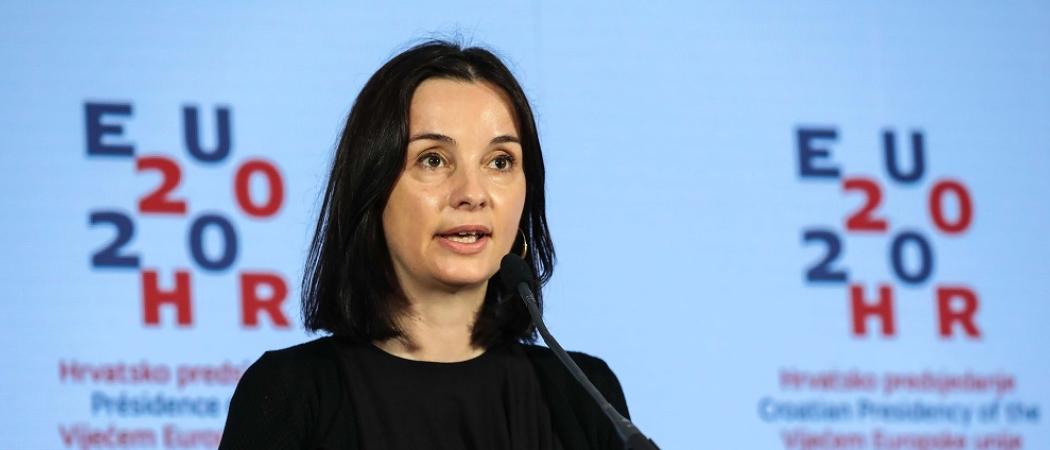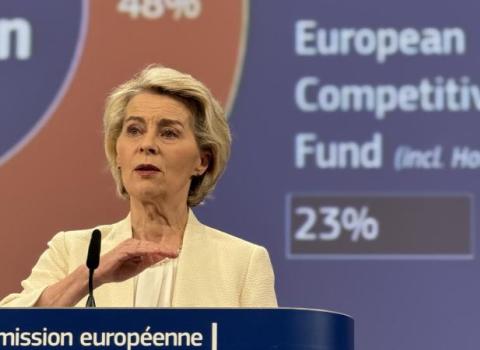Member states agree in principle that Europe needs to make its food supply more resilient to future crises, but ministers are worried about the downside of EU plan to make food production more eco-friendly

Marija Vučković, Croatian Minister for Agriculture speaking at Agriculture and Fisheries Ministers video conference. Photo: European Union.
EU’s biodiversity and green farming plans will require increased investment in research and development, agriculture ministers say.
In an informal videoconference on Monday chaired by the Croatian presidency of the EU Council, ministers broadly agreed the biodiversity and “farm to fork” strategies put forward by the European Commission in May are essential for delivering on the EU’s ambitious green deal plan to boost the economy whilst meeting climate change targets.
To transform food systems, member states will have to revamp production and distribution methods, which will require increased investment in R&D, digitalisation and new technologies, ministers said.
The new proposal for the EU’s multiannual budget, published by the commission in May, foresees a total of €391 billion for agriculture and rural development.
In addition, as of 2021, the commission will make available €10 billion under the ninth framework programme, Horizon Europe, for research on food, bioeconomy, natural resources, agriculture, fisheries, aquaculture and the environment.
Some of the Horizon Europe funding will be funnelled through a partnership for safe and sustainable food systems, which will help member states work together on an EU-wide governance mechanism for research and innovation in sustainable agriculture.
Horizon Europe will also have a research mission focused on improving soil health, and a dedicated partnership on research aiming to support reductions in the use of pesticides and antimicrobial drugs in agriculture by 2030.
Member states have agreed in principle that the EU should invest in R&D to build resilience of its food supply in future crises, after the coronavirus pandemic slowed down food production chains across the continent.
However, ministers say longer negotiations are needed to iron out policy details, as countries are already worried about the impact of the EU’s plan to make food production more eco-friendly.
The commission wants to cut down the use of pesticides by 50 per cent, fertilisers by 20 per cent and the use of antibiotics in farm animals by 50 per cent. It also suggests 25 per cent of Europe’s arable land should be reserved for organic farming, and at least 10 per cent of EU’s farmland would be repurposed to improve biodiversity.
While agreeing with the objectives, ministers argue they could result in higher production costs and reduced yields. They warn environmental requirements should not fall on the shoulders of farmers alone, as they could weaken the competitiveness of the EU agrifood sector and lead to the EU becoming more dependent on food supplies from outside the bloc.
Ministers say the EU should give more flexibility on setting national strategies to achieve those targets. Right now, member states can choose their own use limits for fertilisers, pesticides and antibiotics
EU commissioner for agriculture Janusz Wojciechowski said the plans could allow member states to use different starting points to achieve the new EU-wide targets. “It will not be an easy discussion with member states to find a solution to take into account these different situations and different starting points,” Wojciechowski told ministers.
Wojciechowski hopes for a swift deal on the next multiannual EU budget during the German presidency of the EU Council which begins in July. “I hope the EU will finish this debate as soon as possible,” he said.





 A unique international forum for public research organisations and companies to connect their external engagement with strategic interests around their R&D system.
A unique international forum for public research organisations and companies to connect their external engagement with strategic interests around their R&D system.